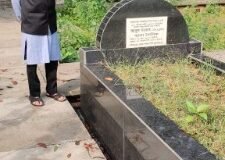By AISHA SIDDIKA :
Bangladesh, a country with so many opportunities is continually turning into a country with lots of risks for its inhabitants; every year thousands of people are becoming the victims of man-made and natural disasters, gender based violence, political restlessness, conflicts, etc. and so on. Bangladesh is one of the world’s most disaster-prone countries. With susceptibility to natural disasters like cyclone and floods, people in this country are increasingly trapping with man-made disasters like the collapse of Rana Plaza, Spectrum factory, and the fire in the Tazrin factory. More than 1,100 and 64 people were killed respectively in April, 2013’s Rana Plaza and April, 2005’s Spectrum factory incidents, and at least 117 peoples’ death was confirmed in the Tazreen’s incident in November, 2012. Each of these incidents left several hundreds more injured, and there remain always a high risk of suffering from post-traumatic stress disorder (PTSD) by people who experienced any such disastrous or stressful events.
On 2014 January, 27 year old Rana Plaza survivor and garment worker Salma Akter committed suicide by hanging herself. She was rescued several days after the collapse of Rana Plaza. She had received severe injuries in her head and also in the body. Her husband informed that, Rana Plaza tragedy and the unbearable pain in her head together brought her into heavy mental sufferings which made her commit suicide. Another 19 year old young woman, Zohora was attempted to suicide by hanging herself after being continuously harassed and tortured by her husband and in-laws’ family for dowry. She was admitted in the ICU of the Dhaka Medical College Hospital (DMCH) with severely broken neck, but unfortunately died several days later.
Photojournalist Turjoy Chowdhury depicts Zohora’s gradual move to a pathetic death on Women News Network (WNN) by posting her photographs taken during her days in the ICU, DMCH till the death.
In Bangladesh, mental health problems are still not seen as important as physical health problems, though mental health consequences are as bad as physical. Mental health is inseparably connected with physical health, so physical wellbeing cannot be ensured by excluding mental wellbeing. Many of the Rana Plaza survivors’ and rescuers’ mental sufferings are still continuing. Many rescuers reported that, those memories, when they pulled up victims’ dead bodies from the collapsed floors of Rana Plaza, often returns in their dreams and eventually brings emotional distresses to them and affects in their daily lives; some rescuers even lost their jobs as they could not concentrate on their tasks after going back from their rescuing mission. A central feature of PTSD is that, survivors often re-experience the components of the traumas they had experienced in their lives.
Each year, thousands of people around the country are affected by at least some sort of traumatic or stressful events individually or collectively which impacts on their mental wellbeing; the level of impact depends largely on victims personal experiences of those events. Experiences of survivors, who were inside of the factories when collapsed or when fire broke out, are not obviously same as the rescuers, who came to the place after the incident. Both of their experiences need to be considered differently.
Many misconceptions are present in the mind of people in Bangladesh like many other countries regarding mental illness, many of them think that the problem cannot be recovered, but the reality is, if diagnosed the problem in early stages and provide proper support, mental illness can recover fully. Rural people often believe that those who suffer from mental illness are bad or evil people, and their illness is considered as a result of their previously committed sin or bad deeds, so mentally ill people are found shackled in rural areas; the practice is profound among illiterate people. Because of illiteracy and ignorance, these people are easily deceived by the local quacks and oblige them to follow their remedy (i.e. on “Pani/Tel pora”, “Tabiz”, “Jhar-fuk”, etc.) in the name of religious exorcism.
Supportive family and society which is associated with better adjustment to stress, is crucial to the steady recovery of mental health sufferers. Stigma in the family and society is undeniably a harmful element which increases mental sufferings of trauma survivors several times, and often make them suicidal. After facing stigma in the family and society, at once they started to blame themselves for the events they experienced and therefore attempt to suicide. Repeated experiences of stigma is a cause of survivors’ engrossed into deep isolation which soon brings them in severe depression. An enabling environment needs to be ensured for survivors like Salma and Zohora, who have faced any traumatic event in their lives, where their surrounding people will listen their stories with empathy and of course non-judgmentally. In the absence of professional help, mentally distressed people are often prescribed for ‘self-help’ or for contributing to their own recovery by spending more time for them, listen their own preferences and do accordingly, and in every way respecting the person inside him/her; this step of recovering from mental illness already receives a good recognition.
Again the world is preparing to celebrate 2015’s Mental Health Day on October with the theme “Dignity in Mental Health”, to emphasize the “self-respecting” practice, and therefore give more recognition to the step “Self-Help” for mental wellbeing. It needs to be taken seriously that, people suffering from mental illness would become potential for this country if they receive proper assistance to recover from their mental sufferings, so it is quite necessary to ensure proper mental health assistance for the sufferers before it is too late.
The writer can be reached at siddika.aisha@yahoo.com
 Weekly Bangla Mirror | Bangla Mirror, Bangladeshi news in UK, bangla mirror news
Weekly Bangla Mirror | Bangla Mirror, Bangladeshi news in UK, bangla mirror news





